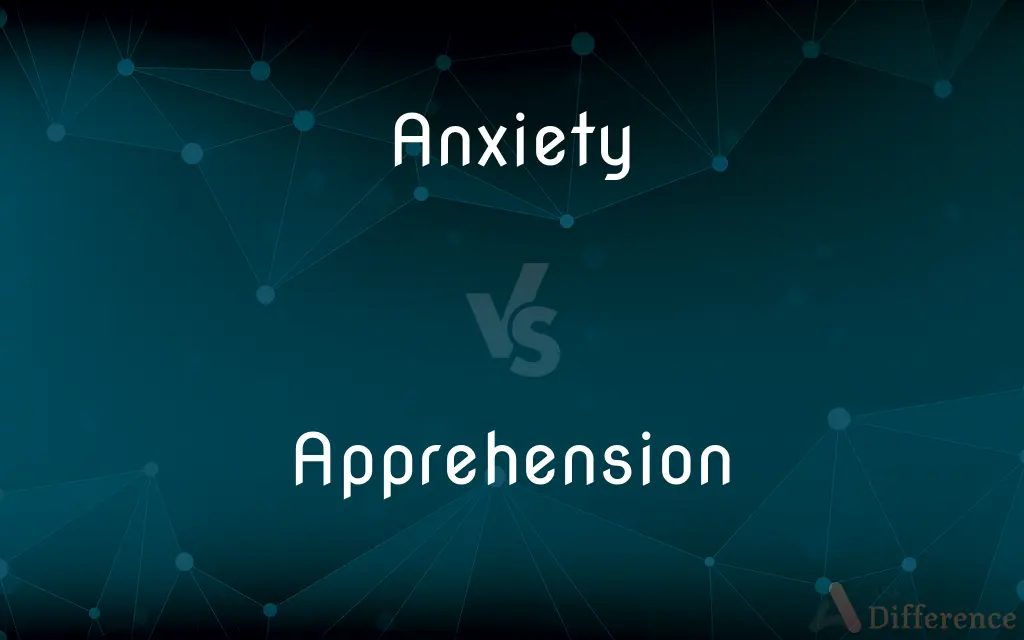Anxiety vs. Apprehension — What's the Difference?
Edited by Tayyaba Rehman — By Urooj Arif — Updated on April 16, 2024
Anxiety is a broader emotional response involving worry, unease, or fear, often without a specific cause; apprehension is a feeling of fear or anticipation of something specific or imminent.

Difference Between Anxiety and Apprehension
Table of Contents
ADVERTISEMENT
Key Differences
Anxiety encompasses a range of psychological conditions characterized by pervasive feelings of worry and fear, typically lacking a concrete or immediate trigger. Whereas, apprehension refers specifically to anxiety or fear about something that is going to happen, such as an upcoming event or particular situation. This specificity makes apprehension more focused compared to the generalized nature of anxiety.
People experiencing anxiety might report persistent nervousness, restlessness, and an inability to relax, which can affect daily functioning and general well-being. On the other hand, apprehension is usually linked to specific upcoming events or known threats, making it more transient and situation-dependent.
Anxiety can manifest in various forms such as generalized anxiety disorder, panic disorder, or social anxiety, each with its own symptoms and triggers. Whereas apprehension, though it may feel intense, is typically a normal and temporary reaction to perceived threats or important forthcoming events.
Treatment for anxiety might involve a combination of psychotherapy, medication, and lifestyle adjustments aimed at managing symptoms over the long term. Apprehension, however, may not require such extensive intervention, often being alleviated by addressing the immediate concern or through short-term coping strategies.
In terms of physiological responses, anxiety can trigger a wide range of physical symptoms like sweating, trembling, dizziness, or a rapid heartbeat. In contrast, apprehension might cause similar but usually less intense symptoms, primarily as a reaction to specific stimuli rather than an ongoing state.
ADVERTISEMENT
Comparison Chart
Definition
A mental health condition with excessive, ongoing worry and fear.
Specific fear or anticipation about a future event.
Symptoms
Includes persistent worry, physical symptoms like headaches, and sleep disturbances.
Usually limited to jitteriness or nervous anticipation before an event.
Duration
Long-term and persistent.
Short-term and related to specific events.
Psychological Impact
Can significantly impair daily functioning and mental health.
Typically less impairing, resolving after the event passes.
Treatment
May require long-term management including therapy and medications.
Often managed through short-term strategies like breathing exercises.
Compare with Definitions
Anxiety
Sometimes linked to other mental health issues like depression.
Her anxiety was compounded by periods of intense depression.
Apprehension
Can usually be alleviated once the specific situation is resolved.
His apprehension was relieved after the successful presentation.
Anxiety
A clinical diagnosis that may include several anxiety disorders.
After her consultation, she was diagnosed with generalized anxiety disorder.
Apprehension
Often related to the fear of known or expected threats.
There was a palpable sense of apprehension as the storm approached.
Anxiety
Can be triggered by stress without specific external causes.
Anxiety often creeps up on him without any noticeable triggers.
Apprehension
Fear or anxiety about a future event.
He felt a strong sense of apprehension the night before his exam.
Anxiety
A pervasive state of excess worry not limited to specific situations.
She felt a constant sense of anxiety that made it hard to concentrate at work.
Apprehension
Generally less disabling than anxiety disorders.
Her apprehension about public speaking didn’t affect her other daily activities.
Anxiety
A condition with physical and psychological symptoms affecting daily activities.
His anxiety manifested in sleepless nights and relentless tension.
Apprehension
A temporary feeling as one anticipates possible outcomes.
Apprehension filled her as she waited for the interview results.
Anxiety
Anxiety is an emotion characterized by an unpleasant state of inner turmoil, often accompanied by nervous behavior such as pacing back and forth, somatic complaints, and rumination. It includes subjectively unpleasant feelings of dread over anticipated events.Anxiety is a feeling of uneasiness and worry, usually generalized and unfocused as an overreaction to a situation that is only subjectively seen as menacing.
Apprehension
Fearful or uneasy anticipation of the future; dread.
Anxiety
A state of uneasiness and apprehension, as about future uncertainties.
Apprehension
The act of seizing or capturing; arrest.
Anxiety
A cause of anxiety
For some people, air travel is a real anxiety.
Apprehension
The ability to apprehend or understand; understanding.
Anxiety
(Psychology) A state of apprehension, uncertainty, and fear focused on the anticipation of a realistic or fantasized threatening event or situation, often impairing physical and psychological functioning.
Apprehension
(rare) The physical act of seizing or taking hold of (something); seizing.
Anxiety
Eager, often agitated desire
My anxiety to make a good impression.
Apprehension
(legal) The act of seizing or taking by legal process; arrest.
Anxiety
An unpleasant state of mental uneasiness, nervousness, apprehension and obsession or concern about some uncertain event.
Apprehension
Perception; the act of understanding using one's intellect without affirming, denying, or passing any judgment
Anxiety
An uneasy or distressing desire (for something).
Apprehension
Opinion; conception; sentiment; idea.
Anxiety
(pathology) A state of restlessness and agitation, often accompanied by a distressing sense of oppression or tightness in the stomach.
Apprehension
The faculty by which ideas are conceived or by which perceptions are grasped; understanding.
Anxiety
Concern or solicitude respecting some thing or event, future or uncertain, which disturbs the mind, and keeps it in a state of painful uneasiness.
Apprehension
Anticipation, especially of unfavorable things such as dread or fear or the prospect of something unpleasant in the future.
Anxiety
Eager desire.
Apprehension
The act of seizing or taking hold of; seizure; as, the hand is an organ of apprehension.
Anxiety
A state of restlessness and agitation, often with general indisposition and a distressing sense of oppression at the epigastrium.
Apprehension
The act of seizing or taking by legal process; arrest; as, the felon, after his apprehension, escaped.
Anxiety
A relatively permanent state of anxiety occurring in a variety of mental disorders
Apprehension
The act of grasping with the intellect; the contemplation of things, without affirming, denying, or passing any judgment; intellection; perception.
Simple apprehension denotes no more than the soul's naked intellection of an object.
Anxiety
A vague unpleasant emotion that is experienced in anticipation of some (usually ill-defined) misfortune
Apprehension
Opinion; conception; sentiment; idea.
To false, and to be thought false, is all one in respect of men, who act not according to truth, but apprehension.
Apprehension
The faculty by which ideas are conceived; understanding; as, a man of dull apprehension.
Apprehension
Anticipation, mostly of things unfavorable; distrust or fear at the prospect of future evil.
After the death of his nephew Caligula, Claudius was in no small apprehension for his own life.
Apprehension
Fearful expectation or anticipation;
The student looked around the examination room with apprehension
Apprehension
The cognitive condition of someone who understands;
He has virtually no understanding of social cause and effect
Apprehension
Painful expectation
Apprehension
The act of apprehending (especially apprehending a criminal);
The policeman on the beat got credit for the collar
Common Curiosities
What can trigger apprehension?
Apprehension can be triggered by anticipating future events or situations that are perceived as challenging or threatening.
Are there specific therapies for treating anxiety?
Yes, therapies like cognitive-behavioral therapy (CBT), exposure therapy, and acceptance and commitment therapy (ACT) are effective in treating anxiety.
Can apprehension affect one's decision-making?
Yes, apprehension can cause hesitation or delay in making decisions, especially if the outcomes are uncertain.
How does apprehension differ from fear?
Apprehension is a type of fear focused on future events, often less intense than immediate, acute fear responses.
Can children experience anxiety and apprehension?
Yes, children can experience both anxiety and apprehension, often manifesting as worries about school or fear of separation from parents.
Is medication always necessary for anxiety?
Not always; the need for medication depends on the severity and impact of the anxiety on daily life. Some people manage anxiety effectively with therapy and lifestyle changes alone.
Does everyone experience anxiety and apprehension in the same way?
No, experiences of anxiety and apprehension can vary greatly between individuals based on personality, past experiences, and overall mental health.
What lifestyle changes can help reduce anxiety?
Regular exercise, a healthy diet, adequate sleep, and mindfulness practices can help reduce symptoms of anxiety.
How long can apprehension last?
Apprehension usually lasts until the anticipated event occurs or the situation is resolved, often short-term.
What role does genetics play in anxiety?
Genetics can influence the likelihood of developing anxiety disorders, with a higher risk seen in individuals with a family history of such conditions.
Is it possible to completely eliminate apprehension?
While it's not always possible to completely eliminate apprehension, it can be managed effectively through coping strategies and rational thinking.
How can one tell the difference between normal apprehension and an anxiety disorder?
Normal apprehension is usually situational and temporary, while an anxiety disorder is more persistent, often significantly impacting daily functioning.
What are the benefits of managing anxiety effectively?
Effective management of anxiety can improve overall quality of life, enhance relationships, and increase productivity and well-being.
Can anxiety have physical health impacts?
Yes, chronic anxiety can lead to physical health issues like heart disease, chronic respiratory disorders, and gastrointestinal conditions.
Share Your Discovery

Previous Comparison
Emoji vs. Emote
Next Comparison
Gymnasium vs. StadiumAuthor Spotlight
Written by
Urooj ArifUrooj is a skilled content writer at Ask Difference, known for her exceptional ability to simplify complex topics into engaging and informative content. With a passion for research and a flair for clear, concise writing, she consistently delivers articles that resonate with our diverse audience.
Edited by
Tayyaba RehmanTayyaba Rehman is a distinguished writer, currently serving as a primary contributor to askdifference.com. As a researcher in semantics and etymology, Tayyaba's passion for the complexity of languages and their distinctions has found a perfect home on the platform. Tayyaba delves into the intricacies of language, distinguishing between commonly confused words and phrases, thereby providing clarity for readers worldwide.















































